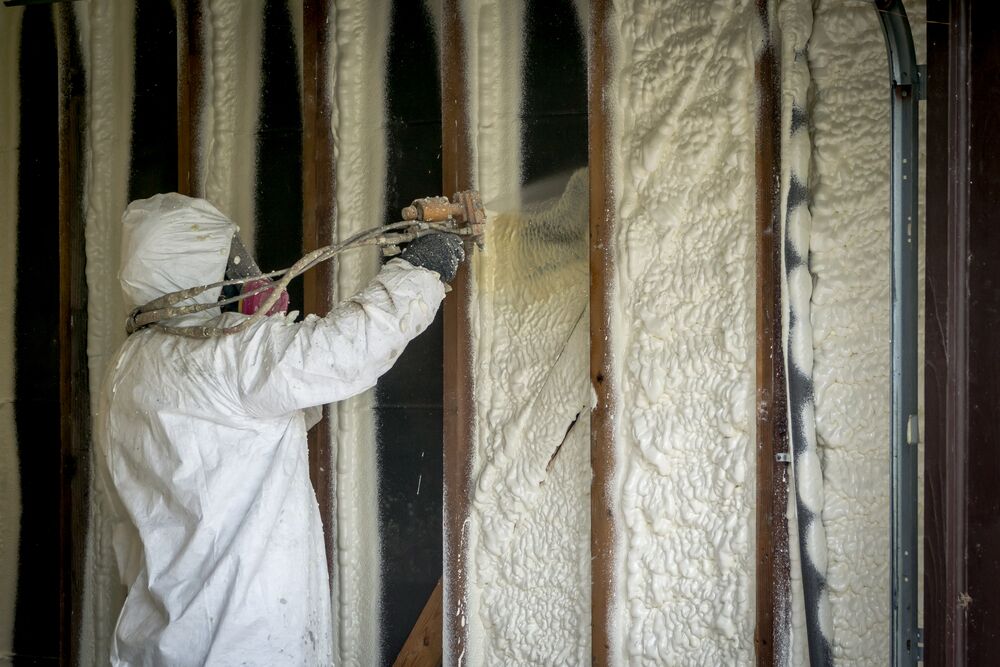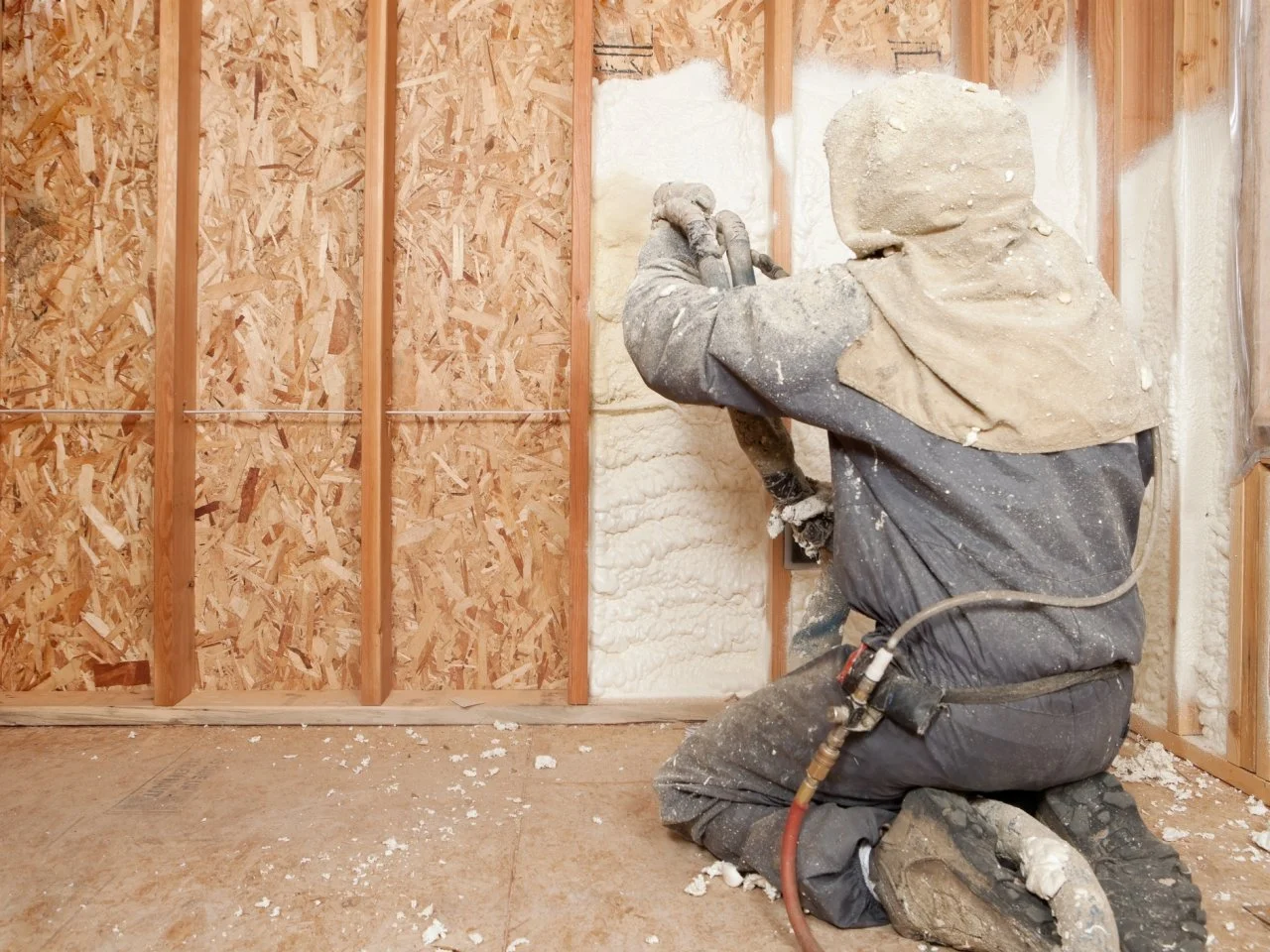How Spray Foam Can Boost Power Performance in your house
How Spray Foam Can Boost Power Performance in your house
Blog Article
Spray Foam: The Ultimate Remedy for Air Sealing and Insulation
Spray foam insulation has actually arised as a leading solution for effective air sealing and thermal insulation, providing a distinct mix of residential or commercial properties that set it apart from traditional techniques. Recognizing the complete range of its benefits, installment procedures, and contrasts with various other insulation kinds is important for making educated choices.
What Is Spray Foam?
Spray foam is a flexible insulation product that integrates the principles of air sealing and thermal resistance to boost power effectiveness in buildings. Composed largely of polyurethane or other comparable substances, spray foam is used as a fluid that expands upon contact with surfaces, creating a strong, continuous layer of insulation. This distinct residential or commercial property enables it to fill up gaps, splits, and spaces that standard insulation products may neglect, offering a remarkable air seal.
There are two primary sorts of spray foam: open-cell and closed-cell. Open-cell spray foam is lighter and a lot more flexible, using outstanding audio absorption and a lower R-value per inch - Spray Foam. On the other hand, closed-cell spray foam is denser, offering a greater R-value, moisture resistance, and added structural stability to developing components
The application process normally includes customized devices, making certain a seamless application that abides by different substrates, consisting of timber, concrete, and steel. This versatility makes spray foam appropriate for both brand-new building and constructions and retrofitting existing frameworks. Its capability to produce an impermeable barrier significantly adds to minimizing energy intake and boosting interior air quality, therefore making it a preferred choice among building contractors and home owners alike.
Benefits of Spray Foam Insulation
One of the most substantial benefits of spray foam insulation is its outstanding capability to produce a constant air obstacle, which effectively decreases power loss. Unlike traditional insulation materials, spray foam expands to fill cracks and gaps, making sure that air leakage is drastically minimized. This particular not just enhances energy performance yet likewise results in lower energy expenses over time.
Additionally, spray foam insulation supplies premium thermal resistance, adding to an extra stable interior setting. Its high R-value per inch permits efficient insulation in constrained rooms, making it ideal for attics, walls, and crawl rooms. Additionally, the moisture-resistant homes of spray foam aid protect against mold and mildew and mildew growth, promoting healthier living conditions.
An additional important advantage of spray foam insulation is its sound-dampening high qualities (Spray Foam). It efficiently decreases sound transmission in between areas, producing a quieter and a lot more comfy home atmosphere. The longevity of spray foam likewise stands out, as it does not sag or clear up with time, preserving its performance throughout its life expectancy
Just How Spray Foam Works
Understanding just how spray foam insulation works is vital for valuing its effectiveness in air securing and thermal resistance. Spray foam insulation includes 2 main elements: isocyanate and polyol resin. When these parts are combined, they undergo a chain reaction that creates the product to broaden quickly, producing a thick foam that fills up cavities, spaces, and fractures.
As the foam expands, it sticks to surface areas, developing a closed seal that dramatically reduces air infiltration. This characteristic makes spray foam insulation very effective at avoiding drafts and moisture infiltration, which can lead to energy loss and damage in time. Additionally, the closed-cell version of spray foam offers exceptional thermal resistance due to its inflexible framework, effectively minimizing warmth transfer.
The one-of-a-kind homes of spray foam allow it to satisfy uneven surface areas, making sure detailed protection and a seamless obstacle. Consequently, spray foam insulation not only boosts energy effectiveness but additionally adds to improved indoor air high quality by lowering the build-up of allergens and contaminants. Inevitably, understanding the technicians behind spray foam emphasizes its duty as a premium option for insulation and air securing in both business and property applications.
Installment Refine Summary

Before installation, the area must be properly cleansed and prepped, making sure that surfaces are totally free from dirt, debris, and dampness. Because contaminants can compromise bond and general performance, this step is important. As soon as the location is prepared, the application includes blending the two components of the spray foam, which expands upon call and loads gaps properly.
Trained experts must conduct the setup, making use of specific tools to ensure consistent protection and ideal thickness. Safety and security precautions, consisting of putting on safety equipment and making sure appropriate ventilation, are critical during this procedure. After application, the foam commonly cures quickly, forming a solid barrier that boosts energy effectiveness.
Contrasting Spray Foam to Standard Insulation
When assessing insulation choices, spray foam insulation stands out in contrast to typical products such as fiberglass and cellulose. Unlike fiberglass and cellulose, which can permit air seepage, spray foam broadens upon application, loading voids and gaps to develop an airtight seal.
Furthermore, spray foam gives a greater R-value per inch than typical insulation kinds, using even more reliable thermal resistance in a thinner profile. This characteristic is specifically valuable precede with minimal cavity deepness. Furthermore, spray foam is resistant to moisture and mold development, which can be a significant interest in cellulose and fiberglass, specifically in damp settings.
Nonetheless, spray foam insulation commonly carries a higher in advance price than its traditional counterparts. Homeowners need to consider this preliminary investment against long-term power financial savings and efficiency advantages. Ultimately, while both insulation types serve their objective, spray foam becomes an advanced option for view it now contemporary insulation demands, read here specifically in terms of air securing and thermal efficiency.

Verdict
In recap, spray foam insulation represents a very reliable solution for attaining optimum air securing and thermal resistance. Its special residential or commercial properties, consisting of moisture resistance and audio dampening, make it suitable for various applications in both brand-new constructions and retrofitting projects (Spray Foam). The first costs may be higher contrasted to standard insulation products, the lasting advantages, such as substantial energy savings and boosted indoor air quality, warrant the investment and underscore its value in contemporary building practices.
Spray foam insulation has emerged as a leading option for efficient air securing and thermal insulation, supplying a distinct combination of residential or commercial properties that establish it apart from standard techniques.Spray foam is a flexible insulation product that incorporates the principles of air sealing and thermal resistance to improve power efficiency in structures.When assessing insulation alternatives, spray foam insulation stands out in comparison to standard products such as fiberglass and cellulose. Eventually, while both insulation kinds serve their function, spray foam emerges as a more sophisticated option for modern insulation demands, specifically in terms of air sealing and thermal performance.
In summary, spray look at here now foam insulation stands for a highly effective solution for achieving optimal air securing and thermal resistance.
Report this page